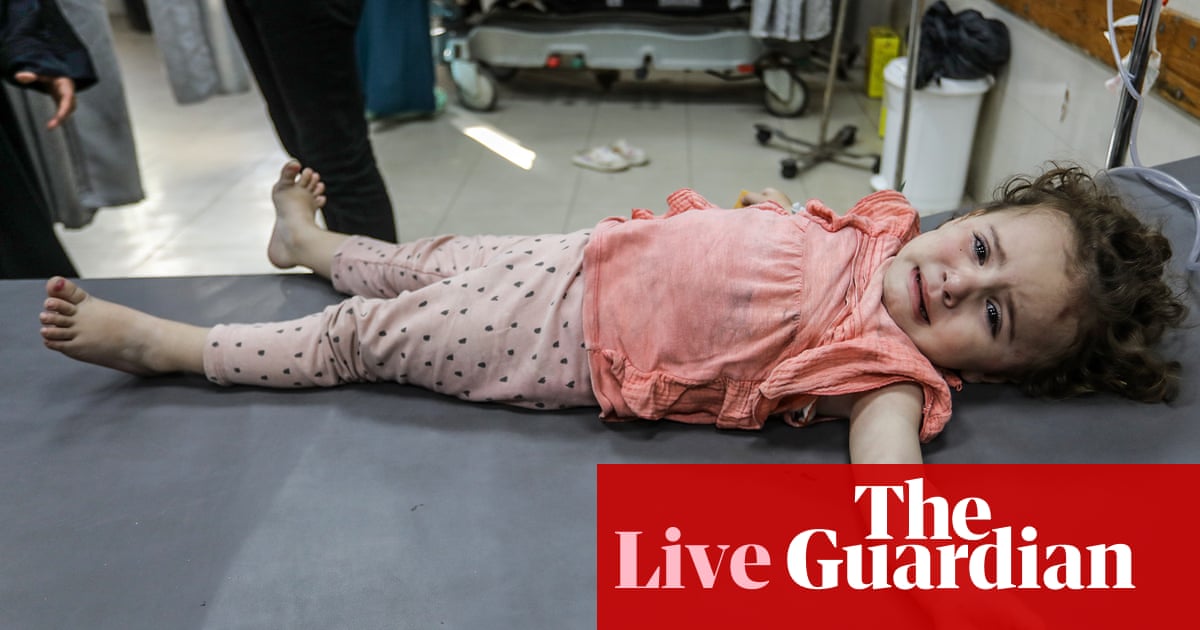Israel has announced a major new offensive in Gaza after launching a wave of airstrikes on the territory thatkilled more than 100 people, in what it said was a fresh effort to force Hamas to release hostages.
In a statement late on Friday, theIsraelDefense Forces (IDF) said they had “launched extensive attacks and mobilized forces to seize strategic areas in the Gaza Strip, as part of the opening moves of Operation Gideon’s Chariots and the expansion of the campaign in Gaza, to achieve all the goals of the war in Gaza”.
Israel has called up tens of thousands of reservists for the new offensive, in which troops will hold on to seized territory and which will lead to a significant displacement of the population,Benjamin Netanyahu has said. Israeli ministers have spoken of “conquering” Gaza.
The announcement came asDonald Trumpfinished a visit to the region that included stops in Saudi Arabia, Qatar and the United Arab Emirates but not Israel.
Earlier on Friday,Donald Trump acknowledged that people are starving in Gazaand claimed the US would have the situation in the territory “taken care of”.
The US president told reporters in Abu Dhabi: “We’re looking atGaza. And we’re going to get that taken care of. A lot of people are starving.”
You can read Jason’s full report here:
The organisation backed by Israel to take over food distribution in Gazaas famine loomshas admitted it would not be able to feed some of the most vulnerable civilians from the militarised compounds it plans to set up.
Aid groups and the United Nations have already refused to work with theGazaHumanitarian Foundation (GHF), a Swiss-registered organisation led by a former US marine. They say it does not have the capacity to end hunger in Gaza and would make it harder to get aid to civilians caught up in other wars by undermining their neutrality.
Israel has not officially laid out its plans for food distribution in Gaza, but statements from the GHF and briefings from Israeli officials envisage four or five militarised distribution centres in southern Gaza, run by private security companies, under the oversight of Israeli military bases.
GHF is in “advanced discussions” with Israel on details and timing and hopes to have news soon, a person involved with planning at the foundation said.
Heads of household would be expected to collect boxes weighing up to 20kg with several days’ supply of food and basic hygiene items like soap for their families. There is no provision for those too sick or weakened by famine to walk long distances across Gaza’s ruined landscape with heavy loads.
“From what we have understood, the plan would increase the ongoing suffering of children and families in the Gaza Strip,” said United Nations Children’s Fund spokesperson Jonathan Crickx.
“How is a mother of four children, who has lost her husband, going to carry 20kg back to her makeshift tent, sometimes several kilometres away?” Crickx said. “The most vulnerable people, including the elderly, people with disabilities, the sick and wounded, and orphans, will face huge challenges to access aid.”
Read Emma’s full story here:
Gaza’s civil defence agency said strikes on Friday killed 108 people, mostly women and children, and some officials in the Palestinian territory put the number killed by Israeli attacks in recent days as high as 250 or 300.
At least 48 bodies were taken to the Indonesian hospital in northernGaza, and 16 to Nasser hospital after strikes on the outskirts of the central town of Deir al-Balah and the southern city of Khan Younis, health officials said.
In Jabaliya, a neighbourhood in the north of Gaza that has seen heavy bombardment for weeks, women sat weeping beside 10 bodies draped in white sheets that were lined up on the ground amid rubble.
Umm Mohammed al-Tatari, 57, said she had been awoken by a pre-dawn attack on northern Gaza.
“We were asleep when suddenly everything exploded around us … everyone started running … there was blood everywhere, body parts and corpses,” she said.
Israel’s military said its air force had struck more than150 “terror” targetsacross Gaza.
Hamas still holds 57 of about 250 hostages seized in its October 2023 attack on Israel, which resulted in the deaths of about 1,200 people, mostly civilians.
Israel has announced a major new offensive in Gaza after launching a wave of airstrikes on the territory thatkilled more than 100 people, in what it said was a fresh effort to force Hamas to release hostages.
In a statement late on Friday, theIsraelDefense Forces (IDF) said they had “launched extensive attacks and mobilized forces to seize strategic areas in the Gaza Strip, as part of the opening moves of Operation Gideon’s Chariots and the expansion of the campaign in Gaza, to achieve all the goals of the war in Gaza”.
Israel has called up tens of thousands of reservists for the new offensive, in which troops will hold on to seized territory and which will lead to a significant displacement of the population,Benjamin Netanyahu has said. Israeli ministers have spoken of “conquering” Gaza.
The announcement came asDonald Trumpfinished a visit to the region that included stops in Saudi Arabia, Qatar and the United Arab Emirates but not Israel.
Earlier on Friday,Donald Trump acknowledged that people are starving in Gazaand claimed the US would have the situation in the territory “taken care of”.
The US president told reporters in Abu Dhabi: “We’re looking atGaza. And we’re going to get that taken care of. A lot of people are starving.”
You can read Jason’s full report here:
